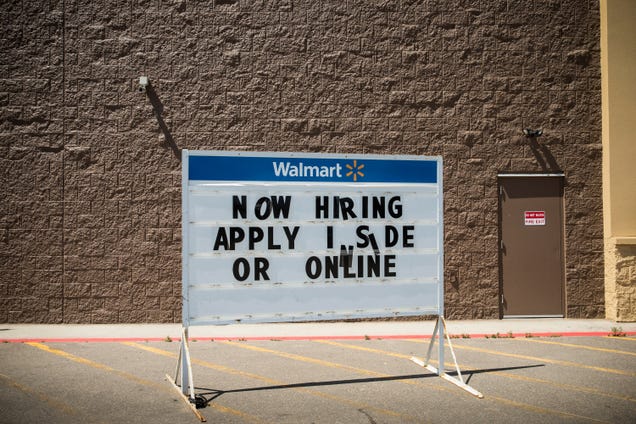Confessions of a checkout girl at Sainsbury’s: A portrait of modern Britain from the other side of the till
So here I am. Day One as a trainee Sainsbury’s checkout girl. My hair is tied back, I’m wearing my bright blue polyester polo shirt, my shoes are flat and sensible and I’ve got my orange name-badge on.
It’s November 2008, and we are headed for a full-blown recession. Across Britain, people are losing their jobs in droves, and already I can see the first signs of what is happening in the wider world.
I’d expected my colleagues to come from largely working-class backgrounds, to be students or housewives looking for a little extra cash. And most of them are.

In the thick of it: Tazeen had to scan 17 items per minute. ‘If you don’t maintain your IPM, we’ll find out,’ she was told
But sitting next to me on the training course is a former City professional, who has lost his job and has been left with no option but to take any position he can get.
Edward tells me he has spent most of his 20s and 30s working in middle management – he’s far too qualified to be doing a menial job like this for £6.30 an hour.
A few days later, I find him wandering around the children’s clothing department with a woman’s top in his hands. ‘Edward, that’s a blouse, not a dress,’ I say, showing him the label. ‘It’s a size 12, not age 12.’ He looks at me in bafflement.
I’m already discovering that the checkout girl’s job may look straightforward, but it is not without its challenges – ones that will never have crossed the minds of the millions of shoppers who use supermarkets every year.
We have to scan 17 items per minute (IPM). ‘If you don’t maintain your IPM, we’ll find out,’ says our plain-speaking till trainer.
All our actions are accountable; CCTV, electronic monitoring, assessments, clocking in and out, customer and colleague feedback. With cameras in every nook and cranny, there is no escape.
I’m an investigative journalist who’s worked for the BBC and Channel 4, and decided to take this job undercover to find out what it will teach me about modern British life.
Two weeks after I start, I’m put on a till as a checkout girl – or COG. At first, I’m slow and make mistakes – but once I get over my nerves, I feel as high as a kite. Even at my fastest, however, I’m only averaging 13 items per minute.
Every day, I serve up to 200 customers. Some people come in every day and spend £30, buying just what they need for dinner that night.
Others spend hundreds of pounds a week. The most I will ever see go through the till on a single shop is £600 – and the woman in question tells me that is a weekly shop for her family of four.
What quickly becomes apparent is that my ’till-side’ view of every customer’s shopping is a privileged intrusion into their lives, and quickly lends itself to the worst kind of cod psychology.
Take the single woman in her 30s buying the one carrot, a single onion, minced beef, a giant bar of Dairy Milk and a glossy magazine. I can already see her night in with dinner-for-one followed by chocolate and Hello! for dessert.
The man with the heavy bags under his eyes quietly purchasing breast pads and nappies for the new mother and her baby at home is totally exhausted.
And the lonely middle-aged man with a penchant for red wine, who gets through a bottle just about every night (I know this because he’s back every couple of days for more).
And then there are the men buying condoms, which for some horrendous reason come in special security boxes that it’s my job to remove.
At least three times a day, I struggle to get the security box off while the purchaser stands in front of me, shifting anxiously on his feet, the rest of the queue smirking behind him.

Embarrassing: Tazeen struggled to remove condoms from their security boxes – much to some customers’ amusement
Usually, I end up having to call over my supervisor to remove the box for me, by which point the customer is usually flushing beetroot red. As he flees the store in embarrassment, I want to tell him that already I’ve seen enough to be immune to the intimate items people buy.
While moments like that are hilarious in hindsight, what strikes me as the days go by is just how desperately lonely so many people are – how much they want to talk to someone, even a stranger on the checkout.
So many mothers with small children stop and talk to me about just about anything, just to be able to have adult conversation after what must be hours cooped up at home with a baby.
Then there are the elderly customers who make me feel I am probably the only person they’ve spoken to that day.
For the elderly in particular, the supermarket illustrates just what a big challenge modern life is becoming to them.
They struggle with the credit card pin pad and forget their numbers. Often, as they try for the second or third time, their hands tremble with nerves. In those moments, I wish we could still accept cheques.
Some of the older customers have such severe arthritis they hand me their purse and ask me to take their money out for them. And none of them comes in at the weekends. When I ask why, they simply tell me that the scale of the supermarket, the overwhelming choice and the crowds make it too frightening a place for them.
They tell me how much they hate trying to pack their goods up into bags, knowing that the people queuing behind them are cursing them for being slower.
I realise too that there is a fundamental difference between the customers coming to ‘basket only’ tills compared to the trolley ones.
Baskets seem to attract men in the 30-50 age group, who offer grunts rather than conversation – and only ever buy a couple of items – one of which is invariably a can of deodorant. And these are the people who treat me the worst.
If I am too slow for them, they actually bellow to themselves like animals preparing for battle. When I need help from a ’till captain’ to sort out a problem with the till machine, one charmer shouts from the back of the queue: ‘I only stood here because I thought it would be quicker.’
This is met by a rumble of approval from the other men waiting in line. One man even throws down his basket and storms off.
Even on the main tills, I am regularly shouted at. One day when I’m at the end of my shift on the checkout – I try to close my till only to be shouted at by a chic lady in her 50s. ‘No! You are not shutting your till. I don’t care if you want to go home – you are going to serve me.’
On another occasion, as I await a supervisor, a woman shouts from down the queue: ‘What’s the holdup?’ As she reaches me, she talks angrily to her companion in a foreign language: I have no idea about what.
As she takes back her change, she turns to me and shouts in my face: ‘You didn’t say please or thank you once.’
I’m mortified, especially as I take in the people behind her staring at me for my reaction. Under normal circumstances, I would have a clever remark ready, but as a checkout girl – or COG – you’re gagged – you can’t fight back.
My heart is racing, I’m humiliated and I feel like crying, but I have to fix a smile to my face and carry on serving.

The sharp end: Tazeem had to smile through abuse dolled out by angry customers
I would love to have a few minutes to compose myself, but the checkout girl has no time for recovery. I’ve done live television, and interviewed difficult politicians for work, yet all of this feels far more stressful.
By Christmas, what is happening to the economy as a whole is beginning to show its face in the supermarket. The store itself is like a pantomime set, with elves, female Father Christmases and two-legged reindeer everywhere.
But customers aren’t completely embracing Christmas cheer, and are counting pennies likr I’ve seen before.
More and more people tell me they know of friends who’ve lost their jobs and they’re worried they might lose theirs. One customer says he usually shops at Marks & Spencer, but although he misses all his luxuries, he can’t justify paying those prices any more.
I begin to lose count of the number of customers who have stared aghast at their bills, or couples who bicker openly at the out over how much has been spent.
Some people even then quietly ask me if we are looking for checkout staff.
Everyone is trying to save money, so they’re keen to cash in their reward points and use any money off vouchers. Ingredients from Jamie Oliver’s ‘Feed the family for a fiver’ range are flying off the shelves too. All around the country I imagine families tucking into the same dinners, chosen simply because of their price.
I also start to notice shopping lists in people’s hands or left discarded on trolleys. Previously, they just wandered around the store picking up whatever took their fancy.
Now, in an attempt to save money, they are planning their meals in advance and getting only what they need. One man even comes through my till a few days after Christmas with reduced price crackers, a chicken roast, discounted Christmas wrapping paper and wine.
‘Are you celebrating Christmas late?’ I blurt out before I can help myself. ‘Tomorrow – seems a good way to save money,’ he replies sadly.
By January, a sea change has occurred. Everyone is now horrified by how much their shopping is costing them, and struggling to meet the costs.
People come through the till, their entire basket filled with red and white boxes: they are buying everything from the Sainsbury’s basics range, from biscuits and bread to mozzarella.
People are buying ready meals less often, opting to make their dinners from scratch, which is cheaper. At my till, countless customers comment that they can no longer afford to spend as much per month on food as they do on their mortgage.
I also notice a sudden surge in the number of bags of compost and packets of vegetable seeds being sold. Customers start telling me they are going to try growing their own vegetables, in their back gardens or even on their window ledges, in an effort to cut costs.
Nowhere is the effect of the credit crunch more noticeable than in the sale of home hair dye kits. When I started here, I would sell two to three a day. By February, I am selling more than 30 a day, mostly to ladies who clearly have heads of expensively highlighted hair. They happily admit that by doing it themselves they can save at least £50.
But despite the recession, people are still treating themselves. As Valentine’s Day arrives, couples buy mussels with butter cream, chocolate cheesecake and a bottle of wine. One chap also throws in flowers, a box of chocolates, Taste the Difference vegetables, ready-made salad and a pretty blouse. It costs him just over £30.
‘It’s my credit-crunch friendly Valentine’s night-in,’ he tells me. Amusingly, many men are actually buying their Valentine cards while their wife is in tow. One woman rolls her eyes and says, ‘How romantic!’ as she packs hers.
And there are very few customers who do not arrive at the checkout without a few bottles of wine in their basket. It probably increased the cost of their shop by 25 per cent, but they tell me it’s still cheaper to drink at home than go to the pub. Perhaps they’re just trying to numb the pain.
By April, my six months as a COG is drawing to a close. And as ever, whatever is happening in the country as a whole is reflected through my till.
In the first spell of hot weather, all the tills are covered with barbecues and bottles of Pimm’s. One couple tells me they are going to make pina coladas and have them in their back garden.
More recently, when swine flu is officially declared a pandemic, almost every customer immediately purchases bottles of antibacterial gel. I get some myself and find I’m slathering it over my hands every four or five customers.
Surely here, handling so much change, so many credit cards and with so many different people standing over me every day, I am at high risk of catching the virus.
My final day comes in early May, and my last customer is the 230th person I’ve served that day.
‘ Congratulations, you are my last customer in this job. Ever,’ I tell the pretty blonde standing in front of me. ‘I’m honoured,’ she replies.
Behind her are a mass of customers. ‘I’m sorry, but I really have to close,’ I say, not once, not twice but eight times. Everyone grunts. Everyone rolls their eyes.
I close my till, do my last cash-up. The next shift are gathered together, huddled over the schedules. I hand over my keys and the till captain takes them distractedly. I say good-bye. Nobody hears me.
As I walk out the big double doors I turn one last time to look at the checkouts. There is already another COG sitting in my chair – ready to begin her own remarkable lesson in life





















Recent Comments